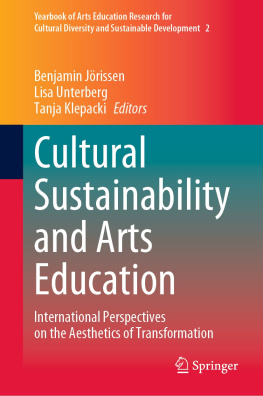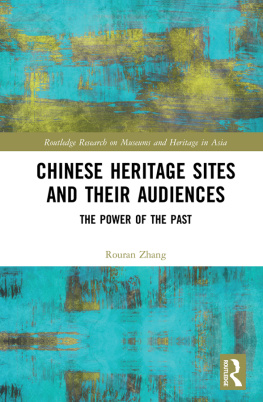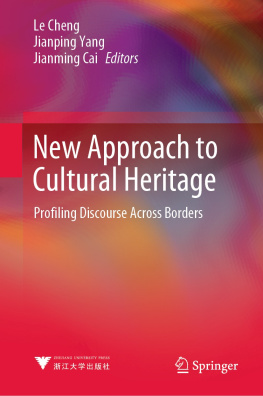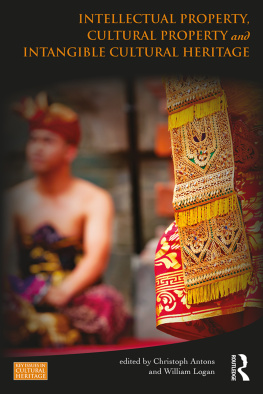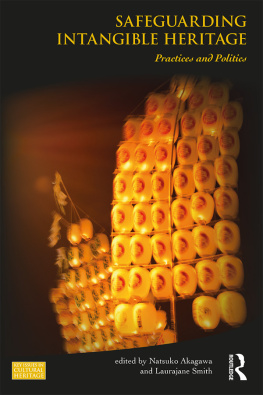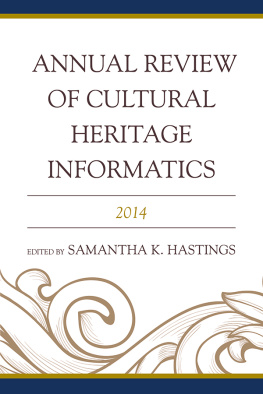Cultural Heritage and the Challenge of Sustainability
DIANE BARTHEL-BOUCHIER
Cultural
HERITAGE
and the
Challenge of
SUSTAINABILITY
First published 2013 by Left Coast Press, Inc.
Published 2016 by Routledge
2 Park Square, Milton Park, Abingdon, Oxon OX14 4RN
711 Third Avenue, New York, NY 10017, USA
Routledge is an imprint of the Taylor & Francis Group, an informa business
Copyright 2013 Taylor & Francis
All rights reserved. No part of this book may be reprinted or reproduced or utilised in any form or by any electronic, mechanical, or other means, now known or hereafter invented, including photocopying and recording, or in any information storage or retrieval system, without permission in writing from the publishers
Notice:
Product or corporate names may be trademarks or registered trademarks, and are used only for identification and explanation without intent to infringe.
Library of Congress Cataloging-in-Publication Data
Barthel-Bouchier, Diane L., 1949-
Cultural heritage and the challenge of sustainability / Diane Barthel-Bouchier.
p. cm.
Includes bibliographical references and index.
ISBN 978-1-61132-237-8 (hardback : alk. paper) ISBN 978-1-61132-238-5 (pbk. : alk. paper) ISBN 978-1-61132-239-2 (institutional eBook) ISBN 978-1-61132-678-9 (consumer eBook) 1. World heritage areasEnvironmental aspects. 2. Cultural propertyEnvironmental aspects. 3. Sustainability. 4. Cultural landscapes. 5. Heritage tourism. 6. Sustainable tourism. I. Title.
G140.5.B33 2012
363.69--dc23
2012020774
Cover design by Jane Burton
ISBN 978-1-61132-237-8 hardback
ISBN 978-1-61132-238-5 paperback
CONTENTS
CHAPTER ONE
Culture: Our Second Nature
CHAPTER TWO
Is Heritage a Human Right?
CHAPTER THREE
Fighting Climate Change and Achieving Sustainability: Organizational Processes of Mission Change
CHAPTER FOUR
Global Cities and Historic Towns: Rising Waters, Threatened Treasures
CHAPTER FIVE
The Loss of Cultural Landscapes: Desertification, Deforestation, and Polar Melting
CHAPTER SIX
Heritage and Energy: The Interaction of Coercive and Normative Pressures
CHAPTER SEVEN
Cultural Tourism and the Discourse of Sustainability
CHAPTER EIGHT
Conclusion: The Future of Heritage
I would like to acknowledge all those heritage managers and professionals who took time from their busy schedules to share their views and answer my questions. Research conventions prevent me from mentioning them all by name. However, I can and would like to thank those people who were instrumental in putting me in touch with others. This list would include Gustavo Araoz, Ned Kaufman, Neil Silberman, Victor Roudometof, and Michael J. K. Walsh. I would also like to thank Neil Silberman and Pamela Jerome for inviting me to participate in the Scientific Symposium of the ICOMOS Advisory Committee meeting in Dublin, Ireland, in 2010, and J. L. Putman and Willem Derde for the kind invitation to serve as a plenary speaker for the ENAME Center Conference on Climates of Conservation.
This research, which involved considerable travel, would not have been possible without a sabbatical and subsequent research leave granted by Stony Brook University. Several Stony Brook colleagues, notably Crystal Fleming, Daniel Levy, Ian Roxborough, John Shandra, Daniela Flesler, Adrien Perez Melgos, and the late Donny George Youkhanna, either read chapters of the manuscript or otherwise helped me think through some of the issues involved. I also benefitted from the advice of Michelle Berensfeld, Sacha Kagan, Volker Kirchberg, and Haiming Yan. My students in courses on cultural sociology and the sociology of the arts served as an important sounding board, as did the students in Peter Mannings Mellon Seminar, presented in association with Stony Brooks Humanities Institute. I am also grateful to Ann Kaplan, the Director of the Institute, for sponsoring a colloquium dedicated to heritage and tourism, with myself and Professors Flesler and Perez Melgos as speakers.
It was a pleasure to work with Jennifer Collier, my editor at Left Coast Press, and I am very grateful to her for her efficiency and overall professionalism. My greatest debt is to my husband, David Bouchier. He shared the travels and the travails, and served as my in-house editor, providing critique and encouragement. The book is dedicated to him; such errors as remain are mine.
I n the spring of 2008 heritage conservationists from around the world gathered in the peninsular city of Macao to discuss the global ecological crisis. Macao was an appropriate location, insofar as its historic center has achieved World Heritage status. But it is better known for its casinos, including the impressive Venetian Resort Hotela simulacrum of the original World Heritage site of Venice.
Theres irony to be found in the fact that well-heeled delegates, disproportionately drawn from distant Europe and North America, added to carbon emissions through their long-distance flights in order to discuss climate change and to forge a common commitment to sustainability. Run by a professional conference organizer, this forum distributed the usual conference souvenir trinkets and relied on the usual seemingly endless supplies of paper napkins, plastic utensils, cups, and bags. Or, as one disgruntled conference attendee put it, all this garbage. The contradictions between the stated purpose of the conference and its actual environmental impact were all too apparent.
As cultural heritage developed as an organizational field in the postwar period, it derived legitimacy from the idea that cultural heritage was a human right among other human rights, such as the right to worship freely or the right not to be tortured. This human right to heritage became embedded in a number of United Nations Educational, Scientific and Cultural Organization (UNESCO) conventions and declarations. It served to justify the classic tasks associated with the conservation of heritage structures and sites, and to expand the definition of heritage to include not just sites but whole land-scapes. In time, the definition was further expanded to encompass not just tangible heritage but also intangible cultural practices.
Yet the very expansion of the heritage field created its own problems. In brief, it was easier to name sites to a UNESCO World Heritage List than to convince national governments to provide the necessary funds to look after all the sites on the list. It was easier to set up academic programs in historic preservation than to find well-paying positions for all the graduates; easier to identify sites that should be saved than to convince the public that it was their human right not simply to save the site, but to pay for the privilege. These challenges added to an underlying sentiment of status inconsistency, as many heritage professionals felt they did not receive recognition commensurate with their contributions when compared, for example, to their counterparts active in nature conservation.
In this book I discuss how heritage organizations have responded to these challenges. I focus in particular on how the theme of sustainability has become an increasingly important consideration in the conservation of historic sites, monuments, and landscapes. Heritage proponents have created a discourse that views cultural heritage as contributing in significant ways to broader efforts to create sustainable societies. To some extent this new emphasis was forced on heritage organizations by governments who viewed historic structures as inherently wasteful of resources and energy inefficient. In large measure, however, the mission of sustainability was freely chosen by heritage conservationists, not only because of material considerations stemming from the tasks associated with their workthe very real threats to historic sites and landscapesbut also in response to the above-mentioned tensions relating to government and public support and to professional status. This new mission was meant to convince decision makers and publics that heritage conservationists were not woolly-headed idealists interested only in art and history, but pragmatic experts who could contribute scientific solutions to global problems of climate change and unsustainable social practices.


